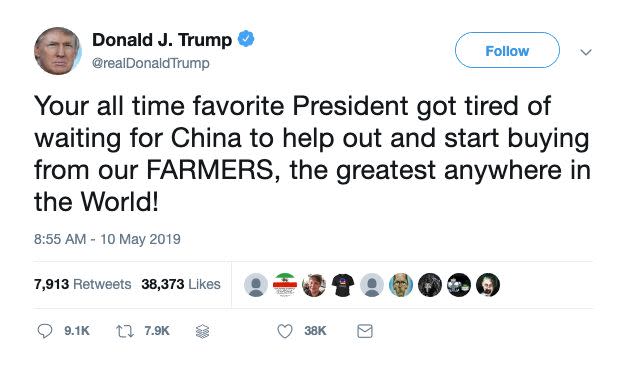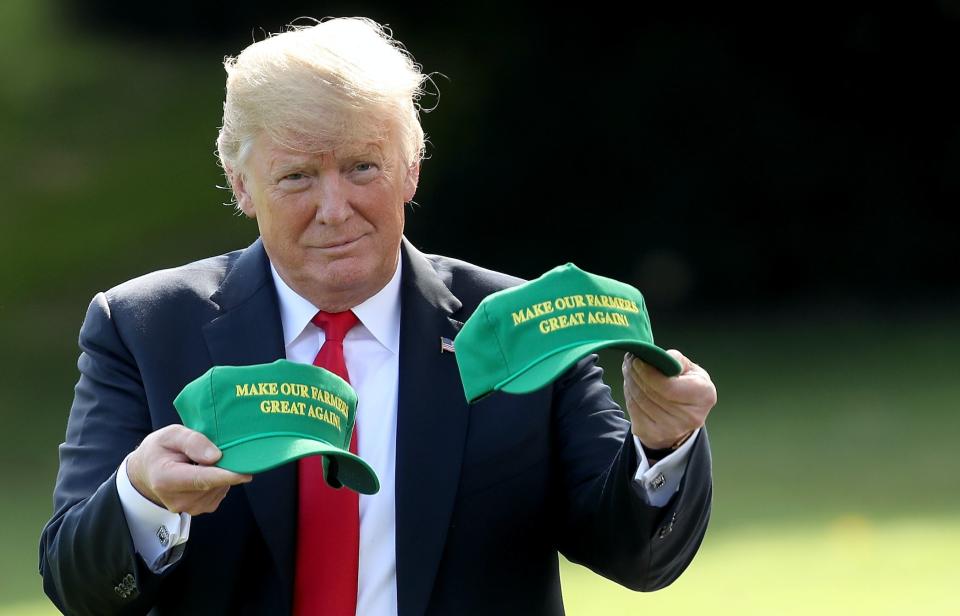Trump: I 'got tired of waiting' for China to 'start buying from our FARMERS'
Negotiations between the U.S. and China are in major focus this week after President Trump announced that he would follow through on this threat to impose tariffs on an additional $200 billion of Chinese imports.
The president sent out a flurry of tweets on Friday, including one stating that part of his motivation was to help U.S. farmers after China stopped buying their agricultural products. He wrote: “Your all time favorite President got tired of waiting for China to help out and start buying from our FARMERS, the greatest anywhere in the World!”

Trump is claiming that the tariffs that the Chinese are paying is going directly to the Treasury, and in turn, helping farmers. However, that’s incorrect. These tariffs are actually being paid by American consumers and businesses.
Farmers have been at the forefront of the U.S.-China trade war after the Chinese began placing retaliatory tariffs in response to Trump’s in 2018. As a result, many American farmers saw their number of exports drastically shrink, driving down profits and causing overall economic stress.
Because of reduced exports to China, 2018 saw the smallest agricultural trade surplus, at $10.9 billion, since 2006. According to the USDA, exports were valued at $140 billion, only a 1% increase from 2017. And in December 2018, it was projected that the U.S. soybean inventory would reach an estimated 955 million bushels in 2019, nearly doubling the 2018 stockpile. That projected number decreased to 910 million bushels in February 2019.
Mark Watne, president of the North Dakota Farmers Union, previously described to Yahoo Finance the harsh impact that farmers have been feeling as a result of these trade tensions.
Among members of his union, “their largest concern comes with the fact that their farm income is off about 50% from probably five, six years ago,” Watne said. “We’re not seeing an end to the trade war, and we’re questioning what a so-called win will look like.”

That definition of “win” still remains vague. Trump has held firm on ensuring that China follows through on their end of the bargain, as the U.S. has been addressing issues like intellectual property theft.
Signs of the deal falling through were made apparent earlier this week after Trump tweeted over the weekend that the tariffs would go up to 25%, stating that China’s negotiation attempts were moving too slowly. As a result, the Dow plunged over 400 points on Monday morning amid market worries.
“Over the course of the last week or so, we have seen an erosion in commitments by China,” Robert Lighthizer, the president’s chief trade negotiator, told reporters in Washington. “I would say retreating from specific commitments that had already been made. That, in our view, is unacceptable.”
Lighthizer and Treasury Secretary Mnuchin will be meeting with Chinese Vice Premier Liu and his negotiating team today.
Adriana is an associate editor for Yahoo Finance. Follow her on Twitter @adrianambells.
READ MORE:
Follow Yahoo Finance on Twitter, Facebook, Instagram, Flipboard, SmartNews, LinkedIn, YouTube, and reddit.

 Yahoo Finance
Yahoo Finance 
